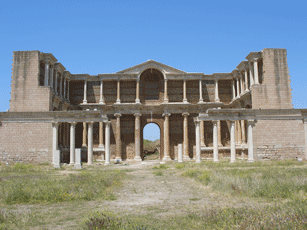CG7 on Peter and the Rock
Rebuilt Gymnasium in Sardis
CG7 reported the following question and answer.
Q Does Matthew 16:18 teach that Christ would build the church upon Peter, as a large segment of Christianity teaches?
A This verse records Jesus’ words “And I also say to you that you are Peter, and on this rock I will build My church, and the gates of Hades shall not prevail against it.” The key word here is rock. What, or who, does Christ mean when He speaks that word?
The word in question is the Greek petra. It denotes a mass of rock, such as could be used for the sure foundation of a house (Luke 6:48) or out of which a tomb could be cut (Matt. 27:60). In other texts, petra refers to the Lord Jesus Christ, the spiritual rock of both testaments and the foundation on which the church is built (1 Cor. 10:4; Rom. 9:33).
Catholic Christians believe that the rock in Matthew 16:18 refers to Peter, the apostle who first served as church bishop in Rome and who became for them the first among all bishops of the universal church. This theory depends on the fact that the Greek form of Peter (petros) is closely related to the word petra.
The difference between petra and petros is in the magnitude and stability of the rock. The former signifies a large, building-sized rock, whereas the latter refers mostly to smaller pieces (stones and pebbles) of the main rock. Thus Jesus is the rock, and Peter is a stone.
If Jesus had intended to identify Peter as the stone upon which He would build His church, it seems He would have said, “You are petros [Peter], and upon this petros [upon you, Peter] I will build My church.”
Instead Jesus used a different word than Peter to describe the foundation of the church He would build. He used petra instead of petros. The fact that Jesus used a different designation for the foundation than for the man strongly suggests that He did not regard the man to be the foundation. It is true that Peter, as an apostle of Jesus Christ, has a place of honor alongside the other apostles in the church’s foundation, all of it anchored to the chief cornerstone, Christ (Eph. 2:20). It is even more true that Jesus himself is the only foundation that can ever be laid for His church (1 Cor. 3:11) and that all the rest of us, including Peter, are smaller stones and pebbles built upward upon the one Foundation.
Peter himself knew and wrote this truth (1 Peter 2:4, 5ff). — Elder Calvin Burrell
Although there are a couple of words I would have removed from the above, CG7’s position is essentially consistent with what LCG teaches on this.
Those who would like to see more on this and the related matters should study the following articles:
Was Peter the Rock Who Alone Received the Keys of the Kingdom? How should Matthew 16:18-19 be understood?
The Apostle Peter He was an original apostle and early Christian leader.
What Do Roman Catholic Scholars Actually Teach About Early Church History? Although most believe that the Roman Catholic Church history teaches an unbroken line of succession of bishops beginning with Peter, with stories about most of them, Roman Catholic scholars know the truth of this matter. This eye-opening article is a must-read for any who really wants to know what Roman Catholic history actually admits about the early church.
Which Is Faithful: The Roman Catholic Church or the Living Church of God? Do you know that both groups shared a lot of the earliest teachings? Do you know which church changed? Do you know which group is most faithful to the teachings of the apostolic church? Which group best represents true Christianity? This documented article answers those questions. Português: Qual é fiel: A igreja católica romana ou a igreja viva do deus? Tambien Español: Cuál es fiel: ¿La iglesia católica romana o La Iglesia del Dios Viviente? Auch: Deutsch: Welches zuverlässig ist: Die Römisch-katholische Kirche oder die lebende Kirche von Gott?
Location of the Early Church: Another Look at Ephesus, Smyrna, and Rome What actually happened to the primitive Church? And did the Bible tell about this in advance?
Apostolic Succession What really happened? Did structure and beliefs change? Are many of the widely-held current understandings of this even possible? Did you know that Catholic scholars really do not believe that several of the claimed “apostolic sees” of the Orthodox have apostolic succession–despite the fact that the current pontiff himself seems to wish to ignore this view? Is there actually a true church that has ties to any of the apostles that is not part of the Catholic or Orthodox churches? Read this article if you truly are interested in the truth on this matter!
Early Church History: Who Were the Two Major Groups Professed Christ in the Second and Third Centuries? Did you know that many in the second and third centuries felt that there were two major, and separate, professing Christian groups in the second century, but that those in the majority churches tend to now blend the groups together and claim “saints” from both? “Saints” that condemn some of their current beliefs.
The History of Early Christianity Are you aware that what most people believe is not what truly happened to the true Christian church? Do you know where the early church was based? Do you know what were the doctrines of the early church? Is your faith really based upon the truth or compromise?
 |
Tweet |
|
